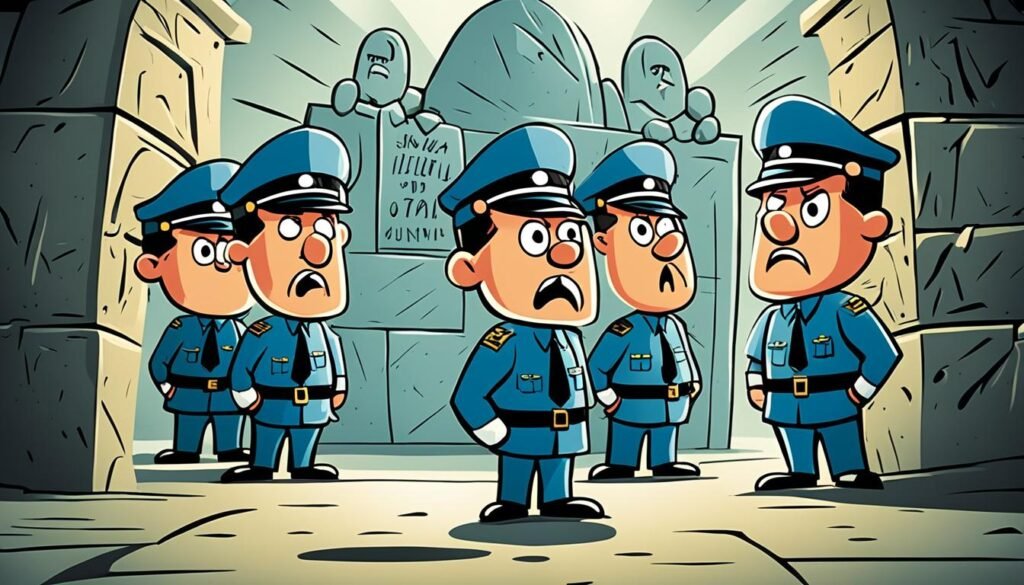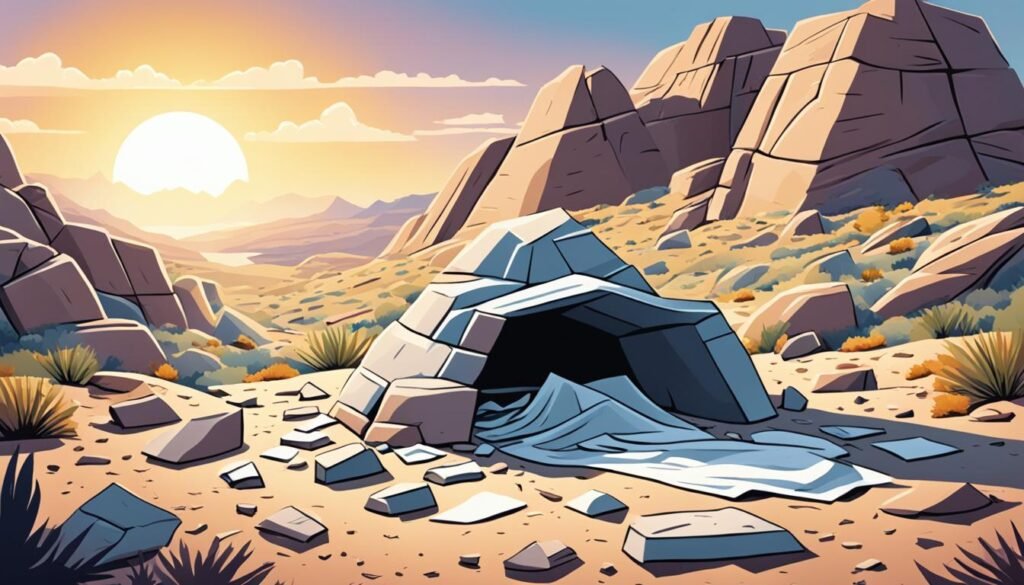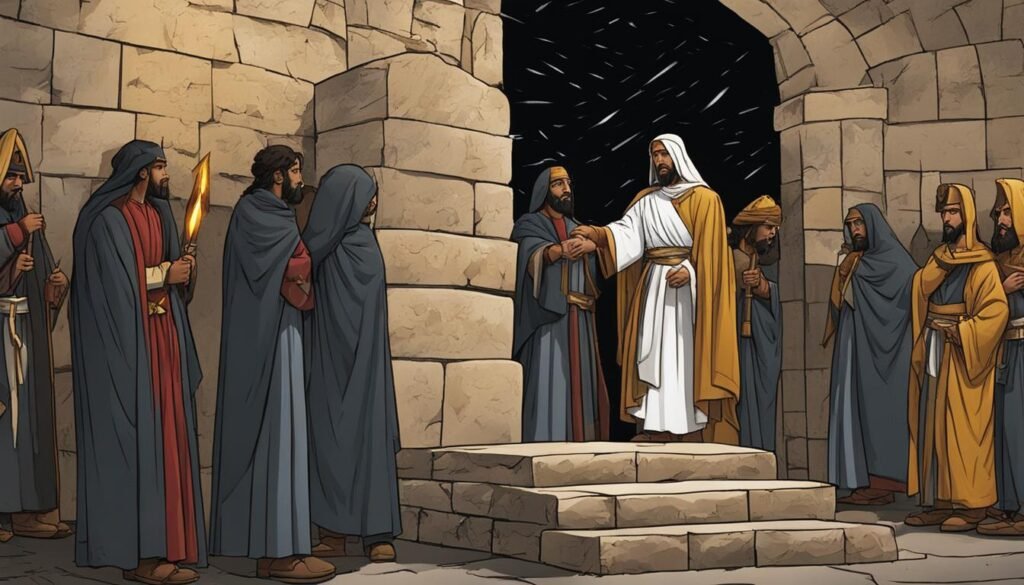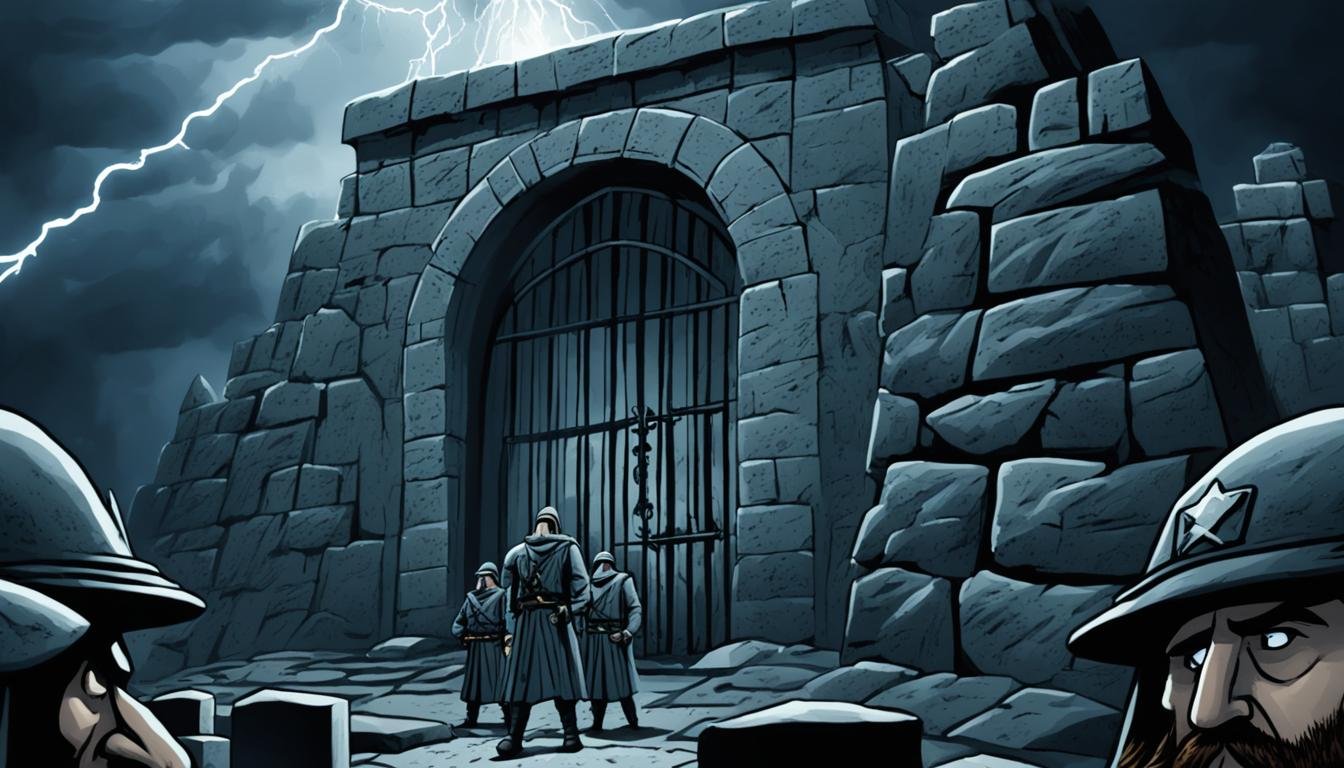According to the biblical narrative, the fate of the guards at Jesus’ tomb took a surprising turn following the resurrection. These Roman guards were entrusted with the task of protecting the tomb, but their encounter with the supernatural changed everything.
In Matthew 28:11-15, the guards reported to the chief priests about the miraculous events they witnessed. They saw an angel appear and witnessed the stone being rolled away from the tomb. Instead of recognizing the significance of these events and repenting for their actions, the chief priests took a different approach.
Offering a large sum of money as a bribe, the chief priests convinced the guards to spread a false story. They were to claim that while they were asleep, Jesus’ disciples had stolen his body. This fabricated tale was meant to discredit the resurrection and preserve their own authority and power.
However, this false story did not stand the test of time. The guards, driven by fear and tempted by the bribe money, complied with the chief priests’ plan. They failed to realize the gravity of their actions and the impact it would have on their own lives.
- The guards at Jesus’ tomb witnessed extraordinary events, including the appearance of an angel and the rolling away of the stone.
- Instead of recognizing the truth, the guards were swayed by fear and enticed by the bribe money offered by the chief priests.
- Their decision to spread a false story about the stolen body of Jesus denied the reality of his resurrection.
- The fate of the guards serves as a reminder of the lengths people may go to deny the truth of Jesus’ resurrection.
- The empty tomb remains a powerful historical fact supporting the reality of the resurrection.
The Actions of the Chief Priests
Upon being informed by the guards about the extraordinary events at Jesus’ tomb, the chief priests had a choice to make. They could have recognized the truth of Jesus’ resurrection and repented for their actions against God. However, instead of acknowledging the reality of the situation, they opted for a cover-up.
The chief priests resorted to bribery in their attempt to conceal the events that took place at the tomb. They offered a considerable sum of money to the guards in order to persuade them to spread a false story. This desperate act reveals just how far the chief priests were willing to go to deny the resurrection of Jesus.
By bribing the guards, the chief priests hoped to create doubt and confusion regarding the truth. They wanted to maintain control, avoid scrutiny, and preserve their own power and authority. Sadly, their actions only served to perpetuate falsehood and hinder the acceptance of the resurrection.
Summary of the Actions of the Chief Priests:
| Action | Motivation | Effect |
|---|---|---|
| Cover-up | Denying the truth of Jesus’ resurrection | Spreading confusion and doubt |
| Bribery | Preserving their own authority and power | Discrediting the testimony of the guards |
Despite their attempts to suppress the truth, the actions of the chief priests ultimately failed to diminish the impact of the resurrection. The truth could not be hidden, and the events at the tomb would continue to shape history.
Motives of the Roman Guards
In the biblical narrative, the Roman guards stationed at Jesus’ tomb found themselves in a precarious position. Having failed to protect the Roman seal placed on the tomb, they faced the wrath of Pontius Pilate, their commanding authority. When the chief priests approached them with an enticing offer of a large sum of bribe money, it is understandable that they succumbed to the temptation. In their minds, accepting the bribe was a means of self-preservation, a way to avoid punishment from Pilate and secure their own safety.
The fear of facing severe consequences for their failure, combined with the allure of the bribe money, influenced the motives of the Roman guards. They saw an opportunity to protect themselves by aligning with the chief priests and spreading the false story about Jesus’ body being stolen by his disciples while they were asleep. It was an act driven by fear and the desire to avoid the potential punishment that awaited them for failing in their duty to protect the tomb.
However, it is important to note that the decision of the Roman guards to accept the bribe money came at a great cost. They chose to betray the truth and actively participate in spreading a false narrative that denied the resurrection of Jesus. In doing so, they disregarded the awe-inspiring events they had witnessed at the tomb, including the appearance of an angel and the rolling away of the stone. The motives of the Roman guards, fueled by fear and self-preservation, led them down a path of denial, ultimately sacrificing their integrity in the process.
| Motives | Description |
|---|---|
| Fear | The guards feared the punishment they would face from Pontius Pilate for their failure to protect the Roman seal on the tomb. |
| Self-Preservation | Accepting the bribe money was seen as a way to secure their safety and avoid the potential consequences of their actions. |
| Temptation of Bribe Money | The large sum of money offered by the chief priests was tempting and influenced their decision to go along with the false story. |
Lack of Wisdom in the Guards’ Actions
Instead of seeking forgiveness from God and protection against Pontius Pilate, the Roman guards chose to seek help from the chief priests to cover up their failure. This lack of wisdom is evident in their failure to recognize that God was the one they should have been afraid of, as demonstrated by the appearance of the angel at the tomb. They should have turned to God in repentance and sought His forgiveness and protection.
The actions of the Roman guards at Jesus’ tomb reveal a lack of wisdom in their decision-making. Rather than acknowledging their failure to protect the tomb and seeking forgiveness from God, they sought the assistance of the chief priests to conceal their mistake. This flawed decision highlights their failure to recognize the fear of God and the importance of repentance.
“The fear of the Lord is the beginning of wisdom.”
As the guards witnessed the appearance of an angel at the tomb, they should have recognized the divine presence and sought God’s forgiveness. Instead, they turned to the chief priests, who were enemies of Jesus, for protection. This demonstrated a clear lack of wisdom in their actions, as they failed to understand the gravity of their situation and the need to repent before God.
Wisdom vs. Fear of God
The guards’ lack of wisdom can be attributed to their disregard for the fear of God. The wisdom to make the right decision in this situation would have come from recognizing the divine intervention they had witnessed and acknowledging their own wrongdoing. But instead of turning to God in repentance, they chose to rely on human intervention and deceit.
Wisdom is often associated with an understanding of who God is and a reverence for His authority. In this case, the guards’ actions revealed a lack of this understanding and a failure to recognize the fear of God as a guiding principle in their lives.
Their failure to seek God’s forgiveness and rely on His protection ultimately led them down a path of deception and denial. As a result, they found themselves entangled in a web of lies orchestrated by the chief priests, further distancing themselves from the truth of Jesus’ resurrection.
The guards’ actions serve as a cautionary tale, reminding us of the importance of wisdom and the fear of God in our own decision-making. By seeking God’s guidance and repenting of our wrongdoings, we can avoid the pitfalls of self-reliance and deceit, and instead, walk in the path of righteousness and protection.
Witnessed Miraculous Events
The guards at Jesus’ tomb had an extraordinary firsthand experience of witnessing miraculous events that should have left an indelible impact on their beliefs. As they stood guard, an angel appeared before them and rolled away the stone that sealed the entrance to the tomb. This awe-inspiring event filled the guards with overwhelming fear, causing them to tremble and become like dead men.
Although it remains unclear whether the guards heard the angel’s words or witnessed Jesus walking out of the tomb, one thing is certain – they were fully aware that something extraordinary had occurred. This powerful testimony of witnessing the angel’s presence and the rolled away stone should have compelled the guards to believe in the resurrection of Jesus.
The magnitude of the events they witnessed should have shattered any doubt or skepticism and reaffirmed their faith in Jesus’ resurrection. Yet, fear and astonishment seemed to have driven their actions, leading to a different path.
“The guards at Jesus’ tomb were direct witnesses to extraordinary events— an angel appearing and the stone being rolled away from the entrance. Such experiences should have compelled them to believe in the resurrection of Jesus.”

Denying the Truth
Despite witnessing the miraculous events at the tomb, the guards allowed themselves to be bribed into denying the truth of Jesus’ resurrection. Their motives for this denial are unclear, but they chose to support the enemies of Christ by actively subverting the truth. This act of denial contradicts the strong impression that the events at the tomb must have left on them.
Significance of the Empty Tomb
The empty tomb of Jesus holds great significance in understanding the truth of his resurrection. It serves as a powerful historical fact that supports the reality of Jesus rising from the dead. The inability of the Jews or anyone else to produce Jesus’ body provides compelling evidence for his resurrection and challenges the false stories that sought to deny this miraculous event.
“He is not here; he has risen!” – Matthew 28:6
The empty tomb refutes the false narrative propagated by the guards and strengthens the belief in Jesus’ resurrection. It serves as a tangible reminder of the historical event that changed the course of human history. The absence of Jesus’ body validates the accounts of his followers who witnessed the resurrected Jesus and encountered him in the days following his crucifixion.
While the empty tomb alone may not be sufficient to convince skeptics, it forms a crucial piece of evidence that aligns with the testimonies of those who personally experienced the resurrection. It withstands scrutiny as a historical fact and contributes to the overall body of evidence that supports the reality of Jesus’ triumph over death.
The Empty Tomb: A Testament to the Resurrection
The empty tomb speaks volumes about the resurrection of Jesus. Its significance lies not only in the absence of Jesus’ body but also in the fulfillment of the prophecies concerning his resurrection. Throughout the Scriptures, it was foretold that the Messiah would rise from the dead, and the empty tomb serves as a compelling confirmation of these prophetic promises.
“For you will not abandon my soul to Sheol, or let your holy one see corruption.” – Psalm 16:10
Beyond its prophetic fulfillment, the empty tomb stands as a testament to the transformative power of the resurrection. It symbolizes hope, victory, and the promise of eternal life for all who believe in Jesus Christ. The empty tomb invites individuals to reconsider their understanding of life, death, and the spiritual realm, prompting them to grapple with the profound implications of Jesus’ resurrection.
A Visual Representation
To further illustrate the significance of the empty tomb, consider the visual representation below:
| Empty Tomb | Possibility of Stolen Body | Jesus’ Resurrection | |
|---|---|---|---|
| Historical Fact | ✓ | ✗ | ✓ |
| Evidence of Victorious Life | ✓ | ✗ | ✓ |
| Confirmation of Prophecy | ✓ | ✗ | ✓ |
This visual representation highlights the undeniable historical fact of the empty tomb, contrasting it with the possibility of a stolen body and unequivocally affirming Jesus’ resurrection. It captures the essence of the empty tomb as a compelling piece of evidence that stands as a historical testament to the resurrection of Jesus.

The Guards’ Account to the Chief Priests
The guards who were assigned to watch over Jesus’ tomb reported the events they witnessed to the chief priests. They recounted the appearance of an angel, the rolling away of the stone, and their overwhelming fear and terror. The details of their account remain unclear, but it is evident that they were aware of the extraordinary events that took place at the tomb.
The guards, in their report to the chief priests, described the awe-inspiring appearance of an angel at the tomb. They witnessed firsthand as the angel rolled away the stone, an event that would have been physically impossible for any human. This supernatural act, combined with the angel’s presence, filled the guards with a mixture of fear and terror, leaving them trembling and paralyzed with awe.
Although the specifics of the guards’ account are not provided, their overwhelming fear and the undeniable reality of the angel’s appearance and the stone’s movement are clear. These extraordinary events would have been the focal point of their report, as they were undoubtedly the most significant aspects of their experience at the tomb.
The guards’ report would have undoubtedly left the chief priests astonished and perplexed. The very individuals who had vehemently opposed Jesus and sought His crucifixion were now confronted with undeniable evidence of supernatural occurrences. This account challenged their authority, religious beliefs, and ultimately, their position of power.
It is intriguing to consider the reactions and discussions that took place among the chief priests after hearing the guards’ account. Did they dismiss it as a mere hallucination or invent elaborate explanations to maintain their control and authority? We can only speculate about the conversations that may have transpired among these religious leaders.
Despite the impact of the guards’ account, it is noteworthy that the chief priests did not publicly acknowledge or address the extraordinary events described by the guards. Instead, they resorted to a scheme involving bribery and deception to suppress the truth and propagate a false narrative surrounding Jesus’ resurrection.
Consequences for the Guards
The fate of the guards at Jesus’ tomb is shrouded in uncertainty, and the exact consequences they faced for their actions remain unknown. It is unclear whether they were punished for failing in their duty to protect the tomb or for succumbing to the temptation of bribery from the chief priests. Falling asleep on duty was a serious offense in the Roman army and carried severe punishments.
The decision of the guards to accept the bribe put them at risk of trouble, as it compromised their integrity and loyalty. The specific outcome of their actions, however, is not mentioned in the biblical accounts, leaving their ultimate punishment or retribution to speculation.

| Consequences for the Guards | Description |
|---|---|
| Possible Punishment | Unknown, but falling asleep on duty was treated harshly in the Roman army |
| Compromised Integrity | Accepting the bribe tarnished their reputation and loyalty |
| Risk of Trouble | By succumbing to the temptation of bribery, the guards put themselves at risk |
While the guards’ actions may have temporarily protected them from immediate trouble or repercussions, the consequences of their choices may have extended beyond their earthly circumstances. Their decision to turn a blind eye to the truth and accept the bribe exposed them to a different kind of trouble.
The Testimony of the Guards
The guards who witnessed the events at Jesus’ tomb left with a powerful testimony that should have sparked belief in the resurrection. Despite their denial of the truth, their firsthand experience should have been undeniable evidence of the miraculous events that unfolded.
It is worth noting that Acts 6:7 mentions that many priests in Jerusalem became believers in Jesus. Considering that some of these priests may have been part of the group that arranged the bribe for the guards, it is possible that they later embraced the truth and acknowledged the resurrection despite their initial involvement in covering it up.
“The guards, despite their denial of the truth, left with a powerful testimony to the resurrection of Jesus.”
The guards’ testimony serves as a reminder that even enemies of Christ can bear witness to the truth. Their firsthand experience of the events at the tomb should have been a catalyst for belief, not denial. However, the guards chose to align themselves with those who sought to suppress the resurrection and perpetuate a false narrative.
The Impact of the Guards’ Testimony
- The guards’ testimony validates the reality of Jesus’ resurrection by providing firsthand accounts of the events.
- It highlights the degree to which even those who witnessed miracles can succumb to the pressures of denying the truth.
- The testimony of the guards emphasizes the need for discernment and a willingness to align with the truth, even in the face of opposition from enemies of Christ.
Despite their initial denial, the guards’ testimony serves as a reminder that the truth of the resurrection cannot be suppressed. The empty tomb, coupled with the firsthand accounts of those who witnessed the events, stands as a powerful testament to the reality of Jesus’ resurrection.
Conclusion
The guards at Jesus’ tomb faced a fate of contradiction and denial in the biblical narrative. Despite witnessing the miraculous events surrounding Jesus’ resurrection, they succumbed to the temptation of bribe money and chose to spread a false story rather than embracing the truth. This unfortunate event highlights the lengths to which people may go to deny the reality of Jesus’ resurrection, even in the face of overwhelming evidence.
However, the empty tomb remains a powerful historical fact that supports the reality of Jesus’ resurrection. It stands as a testament to the biblical narrative and refutes the false stories, including the one propagated by the guards. The guards’ denial ultimately contrasts with the significance of the empty tomb and the truth it represents.
In conclusion, the guards at Jesus’ tomb serve as a reminder of the human tendency to reject the truth and the consequences that can follow. Despite being eyewitnesses to miraculous events, they chose denial over belief. Nevertheless, their actions do not diminish the historical and biblical accounts of Jesus’ resurrection and the transformative power of this pivotal event in Christianity.
FAQ
What happened to the guards at Jesus’ tomb?
The guards at Jesus’ tomb witnessed the appearance of an angel and the rolling away of the stone. Instead of acknowledging the truth of Jesus’ resurrection, they were bribed by the chief priests to spread a false story that his disciples had stolen his body.
What actions did the chief priests take?
The chief priests bribed the guards with a large sum of money to spread a false story about the stolen body of Jesus. They engaged in a cover-up to deny the significance of the events at the tomb.
What were the motives of the Roman guards?
The Roman guards at the tomb were motivated by fear of punishment from Pontius Pilate and the temptation of the bribe money offered by the chief priests. They chose to accept the bribe to secure their own safety.
Did the guards show lack of wisdom in their actions?
Yes, instead of recognizing the appearance of the angel as a sign from God, the guards sought help from the chief priests to cover up their failure. They failed to acknowledge the need for repentance and protection from God.
What miraculous events did the guards witness?
The guards witnessed the arrival of an angel who rolled away the stone from the tomb. This extraordinary event filled them with fear and made them aware that something significant had occurred.
Why did the guards deny the truth?
Despite witnessing the miraculous events, the guards allowed themselves to be bribed into denying the truth of Jesus’ resurrection. Their motives for this denial are unclear, but they chose to support the false stories circulated by Jesus’ enemies.
What is the significance of the empty tomb?
The fact that neither the Jews nor anyone else could produce the body of Jesus is significant evidence supporting the truth of the resurrection. The empty tomb refutes the false stories and strengthens the belief in Jesus’ resurrection.
What did the guards report to the chief priests?
The guards reported the appearance of an angel, the rolling away of the stone, and their overwhelming fear and terror. The exact details of their account remain unclear, but it is evident that they witnessed extraordinary events at the tomb.
What were the consequences for the guards?
The exact consequences faced by the guards are unknown. However, falling asleep on duty carried severe punishments in the Roman army, and accepting the bribe put them at risk of trouble. The specific outcomes are not mentioned in the biblical accounts.
What was the testimony of the guards?
Despite their denial of the truth, the guards left with a powerful testimony to the resurrection of Jesus. Their firsthand experience of the events at the tomb should have led them to believe in the resurrection.
What can we conclude about the fate of the guards at Jesus’ tomb?
The guards’ fate reflects a story of bribery, denial, and the rejection of the truth of Jesus’ resurrection. Despite witnessing the miraculous events, they chose to deny the truth and spread a false story. The empty tomb remains a powerful historical fact that supports the truth of Jesus’ resurrection.
Source Links
- https://www.bibleversestudy.com/johngospel/john20-guards-at-jesus-tomb.htm
- https://www.wordatwork.org.uk/answers/what-happening-guards-matthew-28-1-15
- https://nickcady.org/2023/04/08/what-happened-to-the-guards-who-were-watching-over-jesus-tomb/

I’m Benjamin, a passionate spiritual seeker and creator of Verses and Prayers. Alongside my girlfriend Emma and our pet lizard Mulle, I cherish family life, enjoy exploring new places, and am deeply involved in my church community. My love for reading and singing biblical verses inspires every aspect of my journey.

